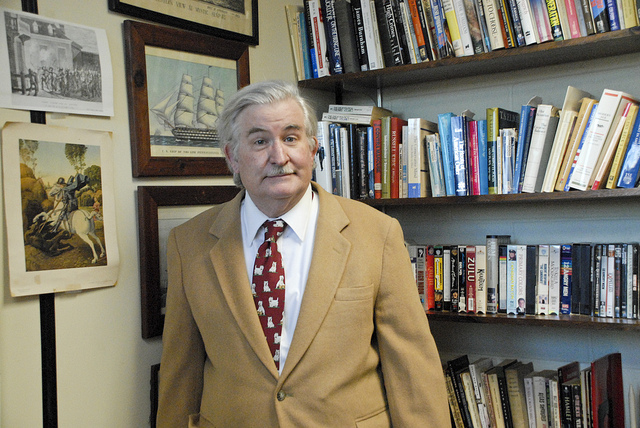In the Frank Capra movie It’s a Wonderful Life, George Bailey learns from Clarence that “one man’s life touches so many others, when he’s not there it leaves an awfully big hole.”
Dr. W. Wesley McDonald passed away in September. His death is cause for reflection on the contribution he made to Elizabethtown College and to the lives of his students.
Wes was instrumental to my educational development at E-town and beyond. I came to campus in 1979, one year before Wes arrived on the faculty. I graduated in 1983 with a B.S. in economics but I took several courses in political science, and I had Wes for four or five courses, including an independent study. He took me to a conference in Michigan the summer of my junior year, and he was a constant source of advice and counsel.
I remember very well Wes’s classes because they made a lasting impression; each one opened up a new intellectual horizon for me and introduced me to a world of ideas of which I was largely unaware. His classes were rigorous and challenged students to think for themselves, and his lectures were engaging, well prepared and balanced talking with classroom discussion. Wes presented different views and arguments, especially in his political theory class, a subject matter in which I became increasingly anxious to learn more. He would contrast thinkers like Burke and Rousseau or Marx and Adam Smith and illustrate how their competing ideas could be seen in the contemporary political environment. Wes’s classes also provided students with ideas and perspectives that were missing from other classes at the college; what I learned was relevant to others I was taking—and especially helpful in graduate school.
Wes’s exams were especially challenging. They required hours and hours of preparation and so much writing that students would joke that their hand felt numb after the test. Typically, he required us to define several terms and write essays on topics that covered a broad range of ideas.
Wes also was my unofficial advisor. He helped me select classes and advised me about life after college. One of the reasons why I value my experience at Elizabethtown College so much is because Wes, as well as other outstanding professors, provided me with first-rate academic experiences and prepared me for the challenges of graduate school. My life was transformed by this experience.
It was largely due to Wes’s influence that I studied political theory in graduate school and, subsequently, received my master’s degree and Ph.D. from The Catholic University of America, the same institution that granted Wes his doctorate. My experience at CUA was more than I could have hoped for. The politics department was exactly what I was looking for in a graduate program.
I have been a college professor for nearly 26 years, and I have Wes to thank for leading me to CUA and to my profession. I am aware that in my relationship with my students Wes’s influence is present: in the way I joke with them, in the way I counsel them, in the way that I listen to their ideas and hopes. I learned the craft of the professoriat first and foremost from Wes.
I can picture Wes McDonald sitting behind his desk, pipe in hand, explaining political ideas with a contemplative look on his face. In those moments, I learned what it meant to be a college professor and what a difference they can make in the lives of students. It was from this insight that I developed the inclination to become one of them. As I sit at my desk and reflect on my professional life, a life that I treasure and find rewarding in many ways, I realize that Wes was one of the primary reasons why I am here. For that and much more, I appreciate the opportunity to have known and to have learned from him.
Like George Bailey he touched many lives. Now that he is gone there is an awfully big hole to fill in the classroom and in our hearts.
— Michael P. Federici ’83
ABOUT OUR GUEST COLUMNIST
 Michael P. Federici is professor and chair of the Political Science Department at Mercyhurst University in Erie, Pennsylvania. He received his B.S. in economics from Elizabethtown College and his M.A. and Ph.D. in politics from The Catholic University of America. He is president of both the Academy of Philosophy and Letters and the National Humanities Institute.
Michael P. Federici is professor and chair of the Political Science Department at Mercyhurst University in Erie, Pennsylvania. He received his B.S. in economics from Elizabethtown College and his M.A. and Ph.D. in politics from The Catholic University of America. He is president of both the Academy of Philosophy and Letters and the National Humanities Institute.
Federici is the author of three books and two edited volumes: The Political Philosophy of Alexander Hamilton, The Challenge of Populism, Eric Voegelin: The Search for Order, The Culture of Immodesty in American Life and Politics: The Modest Republic, and Rethinking the Teaching of American History.
NOTE: The VOICES column of E-town NOW is open to submissions from the campus community about current events and college life. Send queries to now@etown.edu.


